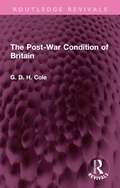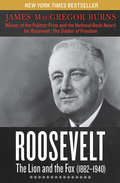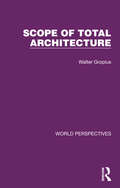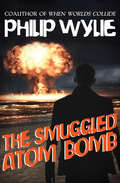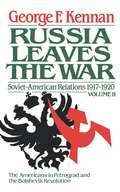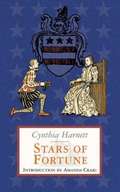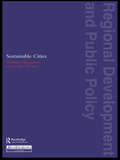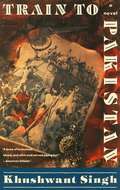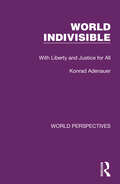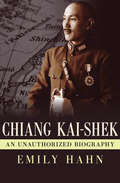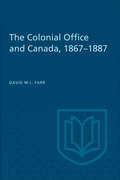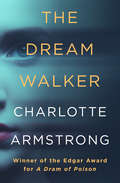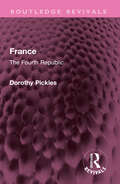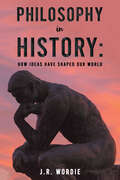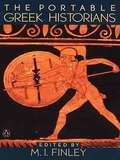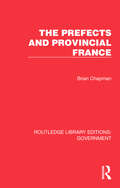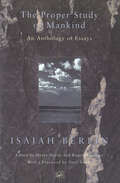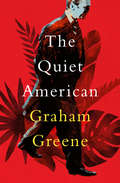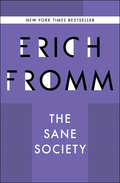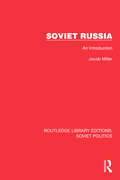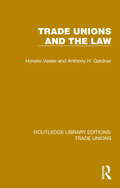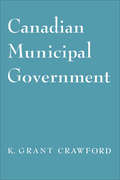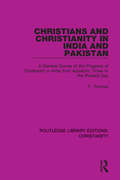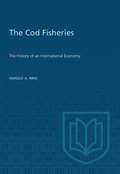- Table View
- List View
The Post-War Condition of Britain (Routledge Revivals)
by G.D.H. ColeFirst published in 1956, The Post-War Condition of Britain measures the extent of changes in Britain since the thirties. It contains more than two hundred tables on such matters as the national income, employment, production and productivity, investment and consumption; health, education, housing, and the insurance, assistance and similar services; on Trade Unions and industrial relations; class structure, political attitudes and party organizations; and the problems of local government and town and country planning. It is simply written, demanding from the reader the minimum of technical knowledge of economics or other specialized studies, and it should serve as an invaluable reference book for all who need exact information.
Roosevelt: The Lion and the Fox (1882- #1940)
by James Macgregor BurnsThis first of Burns's definitive and award-winning two-volume biography of Franklin Delano Roosevelt, mapping the personal and professional development of one of America's most brilliant politicians Franklin Delano Roosevelt was the longest serving president in US history, reshaping the country during the crises of the Depression and World War II. But before his unprecedented run as president, there were decades of steady consolidation of power. Here, renowned historian James MacGregor Burns traces Roosevelt's rise and the peculiar blend of strength and cunning that helped make him such a uniquely transformative politician. Weaving together lively narrative and impressive scholarship, The Lion and the Fox is among the first--and most acclaimed--studies of Roosevelt's time, his talents, and his flaws.
Scope of Total Architecture (World Perspectives #5)
by Walter GropiusOriginally published in 1956, this book provides a non-technical analysis of contemporary building by on the of the world’s greatest architects. Published a few years after the end of WW2, it was an inspiring and constructive picture of what kind of living could lie ahead for Western industrial society. This book, the result of many year in the forefront of architectural experiment and achievement by the author, outlines in practical terms the road to improved existence through science, mass production in building and renewed emphasis on the individual.
The Smuggled Atom Bomb
by Philip WylieA graduate student stumbles across an insidious plot to unleash nuclear terror on America's greatest cities in a blood-chillingly prescient tale from one of thriller fiction's twentieth-century masters Personable, good-looking, and a whiz at physics, graduate student Allan Diffenduffer "Duff" Bogan has a bright future ahead of him. But while staying at the home of an invalid widow in Florida, Duff makes a discovery that freezes his blood: a cache of uranium hidden in the locked closet of a fellow guest. The FBI is initially skeptical, but Duff knows all too well what his findings portend. Suddenly, not only is his future in jeopardy, the fate of millions of Americans hangs in the balance as well. If he cannot expose the horrific plot his nation's enemies set in motion years before, entire cities will be reduced to piles of radioactive rubble in an unthinkable nuclear nightmare stretching from coast to coast. And time, it seems, is rapidly running out.
Soviet-American Relations, 1917-1920 (Vol. II. The Decision to Intervene)
by George F. KennanIn 1918 the U.S. government decided to involve itself with the Russian Revolution by sending troops to Siberia. Never, surely, in the history of American diplomacy, has so much been paid for so little.
The Soviet Mind: Russian Culture under Communism
by Isaiah Berlin Henry Hardy Strobe Talbott"Berlin's great powers of observation combine with his great knowledge and literary gifts to provide us with a fascinating series of insights."-Geoffrey RiklinGeorge Kennan, the architect of U.S. policy toward the Soviet Union, called Isaiah Berlin "the patron saint among the commentators of the Russian scene." In The Soviet Mind, Berlin proves himself worthy of that accolade. Although the essays in this book were originally written to explore tensions between Soviet communism and Russian culture, the thinking about the Russian mind that emerges is as relevant today under Putin's post-communist Russia as it was when this book first appeared more than a decade ago.This Brookings Classic brings together Berlin's writings about the Soviet Union. Among the highlights are accounts of Berlin's meetings with Russian writers in the aftermath of the war; a celebrated memorandum written for the British Foreign Office in 1945 about the state of the arts under Stalin; Berlin's account of Stalin's manipulative "artificial dialectic"; portraits of Pasternak and poet Osip Mandel'shtam; Berlin's survey of Russian culture based on a visit in 1956; and a postscript reflecting on the fall of the Berlin Wall and other events in 1989.Henry Hardy prepared the essays for publication; his introduction describes their history. In his revised foreword, Brookings' Strobe Talbott, a longtime expert on Russia and the Soviet Union, relates the essays to Berlin's other work.The essays and other pieces in The Soviet Mind-including a new essay, "Marxist versus Non-Marxist Ideas in Soviet Policy"-represent Berlin at his most brilliant and are invaluable for policymakers, students, and anyone interested in Russian politics and thought-past, present, and future.
Stars of Fortune
by Cynthia HarnettIn England in 1554 the four eldest Washington children (ancestors of George Washington) become involved in a secret plot to free the Princess Elizabeth who is imprisoned in a nearby castle.
Sustainable Cities (Regions and Cities #No.7)
by Graham Haughton Colin HunterSustainable Cities simultaneously tackles two issues of immediate public concern which also find themselves high on the policy agenda: sustainable environmental development and urban development. The themes of the book - the bringing together of the insights of environmental science, the social sciences and management; the combination of problem analysis with practical application; and a critique of urban environmental problems concentrating on air and water pollution - are illustrated throughout with in-depth material and case studies taken from around the world and are approached from a variety of perspectives: economic, ecological and managerial. Each chapter has a concluding section pointing to key concepts, key reading and a range of discussion points.
Train to Pakistan
by Khushwant SinghIt is a place, Khushwant Singh tells us at the beginning of this classic novel, where Sikhs and Muslims have lived together in peace for hundreds of years. Then one day, at the end of the summer, the 'ghost train' arrives, a silent, incredible funeral train loaded with the bodies of thousands of refuges, bringing the village its first taste of the horrors of the civil war. "Train to Pakistan" is the story of this isolated village that is plunged into the abyss of religious hate. It is also the story of a Sikh boy and a Muslim girl whose love endures and transcends the ravages of war.
World Indivisible: With Liberty and Justice for All (World Perspectives #1)
by Konrad AdenauerOriginally published in the UK in 1956, this book presents the essence of the political philosophy of one of Europe’s best-known post-war statesmen, as well as his experience in government as head of Germany in one of its most critical periods of history. The role of Germany in a (then) new Europe is discussed, along with its rearmament, its greatly restored economic power and its relation to NATO. Germany’s Chancellor gives his views on the world struggle, the cold war, Germany and America, Germany and Israel and the difficulties and responsibilities of the alliance of free nations.
Chiang Kai-Shek: An Unauthorized Biography
by Emily HahnAn in-depth biography of the towering 20th-century Chinese military and political figure who led the government, first on the mainland and then in exile in Taiwan, from the acclaimed New Yorker correspondent who lived in China when he was head of state In 1911, 24-year-old Chiang Kai-shek was an obscure Chinese student completing his military training in Japan, the only country in the Far East with a modern army. By 1928, the soldier who no one believed would ever amount to anything had achieved world fame as the leader who broke with Russia and released the newly formed Republic of China from Communist control. Emily Hahn's eye-opening book examines Chiang's friendship with revolutionary Sun Yat-sen and chronicles his marriage to the glamorous, American-educated Soong May-ling, who converted him to Christianity and helped him enact social reforms. As the leader of the Nationalist Party, Chiang led China for over two decades: from 1927 through the Japanese invasion, World War II, and the civil war that ended with a Communist victory in 1949. After defeat, he retreated with his government to Taiwan where he continued to lead as president of the exiled Republic of China until his death in 1975. Famous for forging a new nation out of the chaos of warlordism, he was an Allied leader during the Second World War, only to end up scorned as an unenlightened dictator at the end of his life. Casting a critical eye on Sino-American relations, Hahn sheds new light on this complex leader who was one of the most important global political figures of the last century.
The Colonial Office and Canada 1867-1887 (Scholarly Reprint Series)
by David M. L. FarrThe twenty years from 1867 to 1887 form a period of significant transition in the history of the British Empire. The present volume makes an intensive examination of the fashioning of imperial policy towards Canada in this period.
The Dream Walker
by Charlotte ArmstrongA New York City drama teacher risks her life to expose a potentially deadly public hoax in this “most uncommon thriller” (New York Herald Tribune). Olivia Hudson, a drama teacher at a Manhattan girl’s school, refuses to let her uncle John Paul Marcus play the role of dupe in a real-life revenge story. Uncle John is a beloved war veteran, a New York institution, and a hard-working philanthropist with an unimpeachable reputation. His mistake—an honorable one, at that—was disclosing the financial chicanery of industrial heir Raymond Pankerman, and it could cost John his life. Raymond has staged the perfect crime, and the perfect frame-up, to destroy the old man. He has everything he needs: a failed and penniless playwright who’d sell his soul if the price was right, a budding television starlet looking for a breakout role, and a susceptible public suckered into believing a supernatural swindle that’s making headlines. As a good man is taken down by the outlandish claims of an “otherworldly” publicity-seeking beauty nicknamed the Dream Walker, Olivia refuses to stand idly by—especially since she has the talent to outwit and outplay an actress at her own duplicitous game. Inspired by the mob mentality of the postwar McCarthy hearings, Charlotte Armstrong’s The Dream Walker (also published as Alibi for Murder) is both an ingeniously clever mystery of double-crosses and triple-twists, and a still-relevant cautionary tale about the irreversible consequences of tabloid journalism and the gullibility of the masses.
France: The Fourth Republic (Routledge Revivals)
by Dorothy PicklesFirst published in 1955 France: The Fourth Republic is the first book to provide an account of the working constitution of the Fourth French Republic. It summarises the innovations introduced by the 1946 constitution, comments on its working and on the revisions, describes how the French Parliament functions, the organisation of local government, and the new constitutional provisions governing the relations between France and her overseas territories. It also describes the outlook and organisation of the political parties and trade unions. It attempts to capture the institutional background to French politics, post war problems, fundamental characteristics of French political life, permanent attitudes of French politicians, and shifting moods of public opinion. This is an essential read for students and scholars of French politics, political history, European politics, and international relations.
Philosophy in History: How Ideas Have Shaped Our World
by J. R. WordieWhat kind of forces have shaped our modern world? Have they been political, economic, scientific, or perhaps even theological? The answer is that all of these forces have been at work, but they have all been the product of ideas, as our views on all of these topics have changed over time. Can ideas be more powerful than armies? Surprisingly, the answer is ‘yes’. History teaches us that nothing is more powerful than an idea whose time has come. Throughout history, rulers, generals and in our own day even stockbrokers and plutocrats have always imagined themselves to be in charge, with that last group even describing themselves as ‘masters of the universe’. In reality, however, all of these individuals have themselves been the products of ideas, owing their positions entirely to existing trends of thought. How this has come about and how it has delivered for us our present-day world are the themes explained in this book.
The Portable Greek Historians
by M. I. FinleyEssential passages from the works of four "fathers of history"--Herodotus's History, Thucydides' History of the Peloponnesian War, Xenophon's Anabasis, and Polybius's Histories.
The Prefects and Provincial France (Routledge Library Editions: Government)
by Brian ChapmanOriginally published in 1955, this book traces the history of the Corps from its foundation in 1800, the successive stages in the career of a Prefect, his or her legal powers and influence on the social, political and economic life of the country. As well as being an original piece of research, it provides an absorbing picture of life in provincial France and explains the fundamental strength of France despite her political contradictions.
The Proper Study Of Mankind: An Anthology of Essays
by Isaiah Berlin‘He becomes everyman’s guide to everything exciting in the history of ideas’ New York Review of BooksIsaiah Berlin was one of the leading thinkers of the twentieth century, and one of the finest writers. The Proper Study Of Mankind selects some of his best essays in which his insights both illuminate the past and offer a key to the burning issues of today.The full (and enormous) range of his work is represented here, from the exposition of his most distinctive doctrine - pluralism - to studies of Machiavelli, Tolstoy, Churchill and Roosevelt. In these pages he encapsulates the principal movements that characterise the modern age: romanticism, historicism, Fascism, relativism, irrationalism and nationalism. His ideas are always tied to the people who conceived them, so that abstractions are brought alive. EDITED BY HENRY HARDY AND ROGER HAUSHEER AND WITH A NEW FOREWORD BY ANDREW MARR
The Quiet American: (penguin Classics Deluxe Edition) (Virago Modern Classics #Vol. 11)
by Graham GreeneA “masterful . . . brilliantly constructed novel” of love and chaos in 1950s Vietnam (Zadie Smith, The Guardian). It’s 1955 and British journalist Thomas Fowler has been in Vietnam for two years covering the insurgency against French colonial rule. But it’s not just a political tangle that’s kept him tethered to the country. There’s also his lover, Phuong, a young Vietnamese woman who clings to Fowler for protection. Then comes Alden Pyle, an idealistic American working in service of the CIA. Devotedly, disastrously patriotic, he believes neither communism nor colonialism is what’s best for Southeast Asia, but rather a “Third Force”: American democracy by any means necessary. His ideas of conquest include Phuong, to whom he promises a sweet life in the states. But as Pyle’s blind moral conviction wreaks havoc upon innocent lives, it’s ultimately his romantic compulsions that will play a role in his own undoing. Although criticized upon publication as anti-American, Graham Greene’s “complex but compelling story of intrigue and counter-intrigue” would, in a few short years, prove prescient in its own condemnation of American interventionism (The New York Times).
The Sane Society (Psicologia Y Psicoan Ser.)
by Erich FrommA New York Times bestseller about overcoming the profound ills of modern society by a legendary social psychologist, the author of Escape from Freedom. One of Fromm&’s main interests was to analyze social systems and their impact on the mental health of the individual. In this study, he reaches further and asks: &“Can a society be sick?&” He finds that it can, arguing that Western culture is immersed in a &“pathology of normalcy&” that affects the mental health of individuals. In The Sane Society, Fromm examines the alienating effects of modern capitalism, and discusses historical and contemporary alternatives, particularly communitarian systems. Finally, he presents new ideas for a re-organization of economics, politics, and culture that would support the individual&’s mental health and our profound human needs for love and freedom. This ebook features an illustrated biography of Erich Fromm including rare images and never-before-seen documents from the author&’s estate.
Soviet Russia: An Introduction (Routledge Library Editions: Soviet Politics)
by Jacob MillerSoviet Russia (1955) discusses the origins and growth of Russian industry, in particular the emergence of a large modern working class and administrative class since the war, how the factories and farms are run, the wage systems, and the plans. The development of farming is described, especially the political management of relations between the peasants and industry. It covers the Soviet political system as a product of Russian history, and the deep changes in the Soviet political system after industrialization. It also looks at finance, the standard of living, strikes, the control of labour, family organization, ideas of world revolution, and the nations of the Soviet Union.
Trade Unions and the Law (Routledge Library Editions: Trade Unions #21)
by Horatio Vester Anthony H. GardnerOriginally published in 1955, this book describes in a clear and concise way the nature of a Trade Union in England from the legal point of view, the particular aspects of the Law which make it possible for Trade Unions to carry on their activities and the restraints which the Law place on them for the protection of their members and the community. It briefly reviews the history of Trade Union Law, describes the Acts of Parliament which made the modern Trade Union possible and deals with those aspects of the Law which are important for those who have industrial relations with Trade Unions.
Canadian Municipal Government
by Kenneth CrawfordThe student who would understand the government of a country can only obtain a complete knowledge of it if he knows something of the government of its local subdivisions. Yet the Canadian student will find studies of Canadian local government almost non-existent. Similarly the citizen or municipal officer looking for details of the organization and operation of the several systems of local government in Canada needs, but has not yet had, one single source with all the information on the subject gathered together in readily available form. Mr. Crawford meets both needs in his excellent study, the sixth volume in the Canadian Government Series. Since local government in Canada comes under provincial jurisdiction, there are ten distinct systems having many similarities and diversities. Mr. Crawford's aim is to show how various Canadian municipal systems function, rather than to present a critical analysis of existing institutions and practices. But first he discusses the necessity of local government, its practical and political importance, the degree of self-government involved in local government and the factors contributing to this, and the weak constitutional position of local government, a position offset by the needs of the community, needs which can be best met by local government and which assure the continuance of that government despite the tightening of central control by province and nation.
Christians and Christianity in India and Pakistan: A General Survey of the Progress of Christianity in India from Apostolic Times to the Present Day
by P. ThomasOriginally published in 1954, Christians and Christianity in India and Pakistan is an historical account of Christianity from the time of Apostle Thomas through to contemporary times. The book records the vicissitudes of the Church prior to the Reformation, the work of the early Protestant missions, and the results of British influence. It provides an overview of Christianity in contemporary India and Pakistan, and explores a range of topics including Indian traditions, the labours of Armenians and the missionaries of the West, the political and social position of Indian Christians, and Christian influences on Hinduism. Christians and Christianity in India and Pakistan will appeal to those with an interest in the history of Christianity.
Cod Fisheries: The History of an International Economy
by Harold Innis<p>The Cod Fisheries, originally published in 1938 and revised and reissued in 1954, presented a new interpretation of European and North American history that has since become a classic. With that rare skill he possessed of weaving together the various strands of a complex and difficult historical situation, Innis showed how the exploitation of the cod fisheries from the fifteenth century to the twentieth has been closely tied up with the whole economic and political development of Western Europe and North America. <p>The relationship of the fisheries to the maritime greatness of Britain and to the growth of New England as an important commercial power is particularly stressed; and in the examination of the conflicts growing up about this industry are revealed the forces underlying the struggle between Britain and France for control of the new world, and the forces which led to the collapse of thye British Empire in America and the rise of an independent new world political power. The political struggles with Nova Scotia and the long conflict with the United States, continuing far into the nineteenth century, are examined in careful detail.</p>
